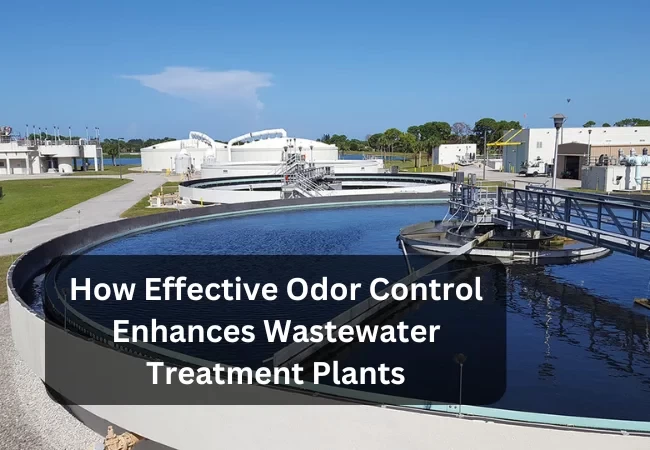How Effective Odor Control Enhances Wastewater Treatment Plants
Effective wastewater management is crucial for maintaining a healthy environment. Controlling odors is more than just an operational concern. Wastewater odor control is a fundamental aspect of environmental stewardship, community health, and regulatory compliance. Odor control wastewater treatment plants play a crucial role in managing sewage and industrial effluents, and within this complex process, odor control systems are indispensable. Let’s delve into why these systems are so vital.
Understanding the Causes of Odor Generation
The origins of odors in wastewater treatment plants are multi-faceted, generated from various biological, chemical, and physical processes. Here are the primary sources:
- Sewage and organic matter decomposition: Wastewater contains organic materials such as proteins, carbohydrates, and fats. During treatment, microorganisms break down these compounds, releasing gases like hydrogen sulfide (H2S), ammonia (NH3), and volatile organic compounds (VOCs), which can produce unpleasant odors.
- Anaerobic conditions in sludge: Sludge treatment often involves anaerobic conditions where bacteria decompose organic matter without oxygen. This process generates Methane (CH4), Hydrogen Sulfide (H2S), and Mercaptans, which are known for their strong and offensive smells.
- Aeration tanks and biological processes: While aeration tanks are designed to enhance aerobic decomposition, improper odor control in wastewater treatment can lead to the release of odorous compounds such as Ammonia and Sulphur compounds.
- Chemical additives and disinfection: Chemicals used in disinfection or as additives can react with organic matter, producing additional odors. For instance, Chlorine and Chlorine Dioxide can create odorous by-products.
- Sludge dewatering and handling: The processes involved in sludge dewatering, such as centrifugation or drying beds, can release concentrated odors due to the buildup of organic solids and microbial activity.
- Poor system design or maintenance: Inefficiencies or failures in the treatment system can lead to the accumulation or release of odorous compounds.
- Environmental factors: Temperature, humidity, wind direction, and atmospheric pressure all influence how odors spread and their intensity.
Understanding these sources helps in developing effective odor control strategies, which are crucial for maintaining a pleasant environment around wastewater treatment facilities.
The Importance of Wastewater Odor Control for Community Health
Odor control in wastewater treatment plants is crucial for several reasons:
- Community relations: Unpleasant odors can negatively affect the quality of life for nearby residents. Effective odor control minimizes nuisance complaints and helps maintain positive community relations.
- Health and safety: Strong odors can cause discomfort and irritation. Prolonged exposure to certain odorous compounds might pose health risks. Proper odor control systems ensure a safer, healthier environment for workers and nearby residents.
- Regulatory compliance: Many environmental regulations set guidelines for odor emissions. Compliance with these regulations is essential to avoid fines, penalties, or legal issues.
- Environmental impact: Odorous emissions can contribute to air pollution and affect ecosystems. Compounds like hydrogen sulfide (H2S) and VOCs can have adverse effects on air quality.
- Public perception: Odors can create negative perceptions about the facility and its environmental impact. By controlling odors effectively, plants can demonstrate their commitment to environmental responsibility.
- Operational efficiency: Odor issues often highlight inefficiencies or equipment problems. Addressing these issues can lead to better system performance and overall operational efficiency.
Alantech's Unique Odor Control System
Alantech has developed an advanced odor control system that stands out in the industry. Here’s what makes it unique:
- Advanced Scrubber Technologies: The Alantech system employs multiple scrubber towers, each designed to remove specific odorous compounds. This multi-stage approach ensures thorough purification.
- Tailored Reagent Use: Odor control system wastewater treatment plants are designed to manage and eliminate odor effectively. Each tower has a storage tank for reagents selected based on the targeted compounds. Reagents such as sulfuric acid, caustic soda, and sodium hypochlorite are used to neutralize specific odors.
- Efficient Air Treatment: Polluted air enters from the bottom of the tower, where it is treated with reagents distributed through the packing material. The treated air then moves to the next tower for further purification. The system is equipped with mist eliminators, essential components of odor control systems in wastewater treatment plants. They effectively remove liquid droplets carrying odorous compounds, enhance system efficiency, protect equipment, and improve overall air quality.
- Effective Chemical Use: Reagents are collected and recirculated, ensuring efficient use and reducing waste. The system is designed to handle various odorous molecules like NH3, amines, H2S, and Mercaptans effectively.
In conclusion, effective odor control in wastewater treatment plants is essential to maintain community health, adhere to regulations, and enhance operational efficiency.
At Alantech, the best industrial water treatment plant, we are committed to providing high-quality products and solutions that help effectively manage and treat wastewater. With a strong focus on sustainability and years of experience, we have established ourselves as a trusted partner for delivering effective and innovative solutions to a wide range of clients. Our advanced wastewater odor control system shows how innovative technologies can address these challenges, ensuring cleaner environments and improved public perception.


